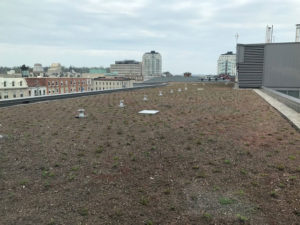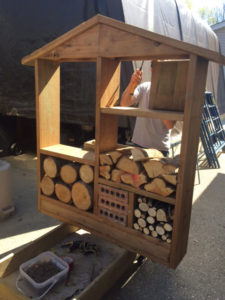On this page
Did you know that Guelph’s City Hall has a green roof? Installed in 2009, the green roof provides a number of benefits including:
- Absorbing excess stormwater
- Increasing the building’s energy efficiency
- Providing habitat for plants, animals and pollinating insects
Flowering plants reproduce with the help of bees and other pollinating insects, including many food crops such as apples. All across the country, pollinators are decreasing. Increasing the habitat for these pollinators is important for their survival and for ours.

What’s on the roof?
The green roof has many different plant species, including pollinator-friendly species such as lance-leaved coreopsis, hairy beardtongue, nodding onion, wild chives and Autumn Joy Sedum.



Food for thought
These rooftop flowers provide a continuous supply of nectar for bees and other pollinators in the spring and summer seasons. They work together with plants and trees in the surrounding downtown and neighbourhoods and vegetation along the nearby rivers to provide food that supports bees and other pollinating insects.

A condo for bees
In 2018 a bee condo was installed on the green roof. This structure provides a place for pollinating insects including our native solitary bees to rest, hibernate over the winter and nest. Unlike social bees (honey bees) that build and nest in hives, solitary bees work individually to transfer pollen from flower to flower. Many of them nest alone in wood, or hollow/pithy-stemmed plants like those in the bee condo.
How to help pollinators in your own backyard
- Create a pollinator-friendly garden at home. For tips on how to build a pollinator garden, check our healthy landscapes program.
- Volunteer at one of our community gardens and start some pollinator-friendly growing. You can learn about community gardens and volunteer at guelph.ca/communitygardens.
- Volunteer with many local organizations such as Pollination Guelph, Ontario Public Interest Research Group (OPIRG)’s Speed River Project, or Trees for Guelph
